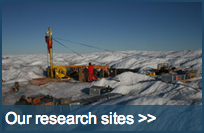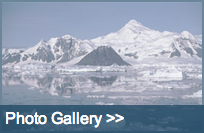The Abstract
The melting of continental ice (glaciers, ice caps and ice sheets) is a substantial source of current sea-level rise, and one that is accelerating more rapidly than was predicted even a few years ago. Indeed, the most recent report from Intergovernmental Panel on Climate Change (AR4, in 2007) highlighted that the uncertainty in projections of future sea-level rise is dominated by uncertainty concerning continental ice, and that understanding of the key processes that will lead to loss of continental ice must be improved before reliable projections of sea-level rise can be produced.
The ice2sea programme will draw together European and international partners, to reduce these uncertainties. We will undertake targeted studies of key processes in mountain glacier systems and ice caps (e.g. Svalbard), and in ice sheets in both polar regions (Greenland and Antarctica) to improve understanding of how these systems will respond to future climate change. We will improve satellite determinations of continental ice mass, and provide much-needed datasets for testing glacier-response models. Using newly developed ice-sheet/glacier models, we will generate detailed projections of the contribution of continental ice to sea-level rise over the next 200 years, and identify thresholds that commit the planet to long-term sea-level rise.
We will deliver these results in forms accessible to scientists, policy-makers and the general public, which will include clear presentations of the sources of uncertainty. The ice2sea programme will directly inform the ongoing international debate on climate-change mitigation, and European debates surrounding coastal adaptation and sea-defence planning. It will leave a legacy of improved understanding of key cryospheric processes affecting development of the Earth System and the predictive tools for glacier-response modelling, and it will train a new generation of young European researchers who can use those tools for the future benefit of society.


